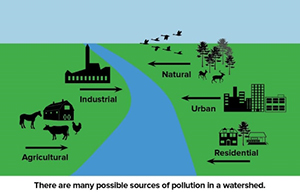To receive RFP solicitations, grant information, and Nonpoint Source News, subscribe to our contact list here
Nonpoint Source Pollution: What is it and what are we doing about it?

Nonpoint source (NPS) pollution occurs when rainfall or irrigation runs over land picking up pollutants and carrying them to rivers, lakes, and coastal waters. Unlike point source pollution, nonpoint source pollution is diffuse, making it difficult to identify and control the source of the problem.
The 1987 amendments to the Clean Water Act (CWA) established the Section 319 Nonpoint Source Management Program. Under this section of the CWA, states receive grant money each year that supports a wide variety of activities, including technical assistance, financial assistance, education, training, monitoring, and other efforts to minimize nonpoint source impacts on water quality. The Section 319 program is coordinated by the United States Environmental Protection Agency (EPA) on a national scale.
Each year, the Nonpoint Source Program submits an Annual Report to EPA. This report includes information on all recently closed and currently open 319 implementation projects, and it describes State outcomes for the annual Nonpoint Source Management Plan milestones and goals.
FY2024 SC Nonpoint Source Management Program Annual Report
SC Nonpoint Source Management Plan 2020-2024 An updated five-year Nonpoint Source Management Plan is currently in review.
South Carolina receives an annual grant allocation from EPA to address nonpoint source pollution as described in the state's NPS Management Plan. Along with regulatory efforts, SCDES passes a portion of these funds to organizations to implement watershed plans. These implementation grants are solicited periodically through a competitive process, and can be geared toward a variety of nonpoint source concerns that cannot be fully addressed through regulation. Projects engage organizations to install on-the-ground best management practices (BMPs) and do public education and outreach. Past and current project examples include septic repair/replacement, stream restoration, green infrastructure, conservation easements, agricultural BMPs, and more. View past and current implementation projects, on the Section 319 Grant page.
Funds from the Section 319 program and the Clean Water State Revolving Fund (CWSRF) can be used in conjunction by public entities to implement best management practices to address nonpoint source pollution in South Carolina.
319 Nonpoint Source and Clean Water State Revolving Fund Joint Funding Opportunities
SCDES also funds watershed plan development for areas where nonpoint source pollution affects surface waters and drinking water intakes. In these cases, SCDES periodically solicits proposals to develop source water protection watershed plans. The development of watershed plans opens up additional funding opportunities in that watershed, including 319 implementation projects. For more information, visit the Watershed Plan Development Grant page.
View a list of approved SCDES funded watershed plans to determine if your watershed is eligible for a 319 implementation grant.
For more information on the Section 319 NPS grant program, contact Shea McCarthy, Shea.McCarthy@des.sc.gov .

